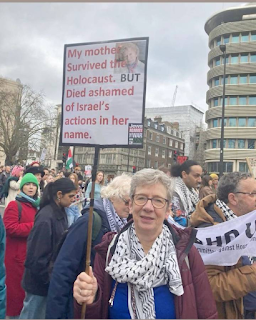Judaism - Israel - Palestine - Part V
Part IV - This is Part V
https://www.georgemarx.org/2024/01/judaism-israel-palestine-part-iv.html
Jewish militants attacked several British immigration offices in Jerusalem and other cities on February 12, 1944. The Irgun, Haganah, and LEHI (“Stern Gang”) organizations established the United Resistance Movement (Tenuat Hameri) against the British government in October 1945. Jewish militants attacked and destroyed railway tracks throughout the country on October 31-November 1, 1945, resulting in the deaths of one government policeman, one British government soldier, and two civilians.
One might
guess from significant portions of the summary of the decades leading up to
1948 (in the referenced link above), that the Jewish forces were “the
aggressor” and that the Palestinians were the aggrieved group. Most summaries of the period leading up to
1948 omit (or minimize) such things and focus instead upon “The Arab Rebellion”
from 1936-1939 (and similar attacks that Palestinians made upon Jewish
residents of Palestine).
The Jewish side’s
efforts tended to be the “radical” Jewish forces who were selectively pursued
by the British, oft times relatively unsuccessfully. The Palestinian’s efforts were less
organized, and the repression was often collective punishment.
On
the eve of May 14, the Arabs launched an air attack on Tel Aviv, which the
Israelis resisted. This action was followed by the invasion of the former
Palestinian mandate by Arab armies from Lebanon, Syria, Iraq, and Egypt. Saudi
Arabia sent a formation that fought under the Egyptian command. British trained
forces from Transjordan eventually intervened in the conflict, but only in
areas that had been designated as part of the Arab state under the United
Nations Partition Plan and the corpus separatum of Jerusalem.
Between 1947 and 1949, at least 750,000 Palestinians from a 1.9 million population were made refugees beyond the borders of the state. Zionist forces had taken more than 78 percent of historic Palestine, ethnically cleansed and destroyed about 530 villages and cities, and killed about 15,000 Palestinians in a series of mass atrocities, including more than 70 massacres.
Though May 15, 1948, became the official day for
commemorating the Nakba, armed Zionist groups had launched the process of
displacement of Palestinians much earlier. In fact, by May 15, half of the
total number of Palestinian refugees had already been forcefully expelled from
their country.
https://www.aljazeera.com/features/2017/5/23/the-nakba-did-not-start-or-end-in-1948
Jewish mortars and
loudspeaker trucks shook Arab neighborhoods in early 1948 as sectarian fighting
consumed the newly partitioned land that would soon become Israel. Amid the
prolonged shelling, the trucks would broadcast the threatening sounds of wailing
sirens, fake screams and evacuation warnings. …
“The
element of surprise, long stints of shelling with extremely loud blasts, and
loudspeakers in Arabic proved very effective when properly used,” reads an
Israel Defense Forces intelligence report from June 1948 that called Jewish combatants “the main factor” in the
exodus.
“Each
and every district underwent a wave of migration as our actions in that area
intensified and expanded,” the report stated, adding later that sometimes Arabs
would attempt to return home shortly after fleeing, “which forced us to engage,
on more than one occasion, in expelling residents.”
https://www.washingtonpost.com/history/2023/11/03/israel-nakba-history-1948/
Some
may argue that the quotes above point to Israel as having been created in ways
that cast doubt upon the fairness of what transpired from 1947-1949.
I
would argue that Israel (and its creation) has been unfairly viewed predominantly
as “the underdog” and The Palestinians as essentially “pawns” of Israel’s
neighbors. Egypt, Syria, Jordan,
Lebanon, and Iraq are viewed as “the villains”.
The
Arab Legion was the only military force that seriously was a potential threat to
the Israeli military. They also did not,
by choice, seek to “invade” beyond the West Bank and Jerusalem. Within Jerusalem, the Legion did not attack
(Jewish) West Jerusalem.
None
of what is noted (by me) above is intended to minimize the intensity of the
warfare. None of this minimizes the
loss of life Israel’s had.
My
cousin Daniel died in this war. My
brother was named after him. His
brother’s wife Ilana was wheelchair bound for the last 30+ years of her
life. I was unable to visit her circa
1981, because she committed suicide after her husband Benjamin (where my son’s
name came from) died of cancer. She did
not want to “be dependent” on others. Ilana
was a wonderful person.
The war ended in
1949 with Israel’s victory, but 750,000 Palestinians were displaced, and the
territory was divided into 3 parts: the State of Israel, the West Bank (of the
Jordan River), and the Gaza Strip.
Over
the following years, tensions rose in the region, particularly between Israel
and Egypt, Jordan, and Syria. Following the 1956 Suez Crisis and Israel’s invasion of the
Sinai Peninsula, Egypt, Jordan, and Syria signed mutual defense pacts in
anticipation of a possible mobilization of Israeli troops. In June 1967,
following a series of maneuvers by Egyptian President
Abdel Gamal Nasser, Israel preemptively attacked Egyptian and Syrian air
forces, starting the Six-Day War. After the war, Israel gained territorial
control over the Sinai Peninsula and Gaza Strip from Egypt; the West Bank and
East Jerusalem from Jordan; and the Golan Heights from Syria.
Six
years later, in what is referred to as the Yom Kippur War or the October War,
Egypt and Syria launched a surprise two-front attack on Israel to
regain their lost territory; the conflict did not result in significant gains
for Egypt, Israel, or Syria, but Egyptian President Anwar al-Sadat declared the
war a victory for Egypt as it allowed Egypt and Syria to negotiate over previously ceded territory.
Finally, in 1979, following a series of cease-fires and peace negotiations,
representatives from Egypt and Israel signed the Camp David Accords, a peace treaty that ended
the thirty-year conflict between Egypt and Israel.
https://www.cfr.org/global-conflict-tracker/conflict/israeli-palestinian-conflict#:~:text=The%20war%20ended%20in%201949,Egypt%2C%20Jordan%2C%20and%20Syria.
Succeeding
sections of this writing will address a lot of this in more detail.
https://www.georgemarx.org/2024/02/judaism-israel-palestine-part-vi.html


Comments
Post a Comment